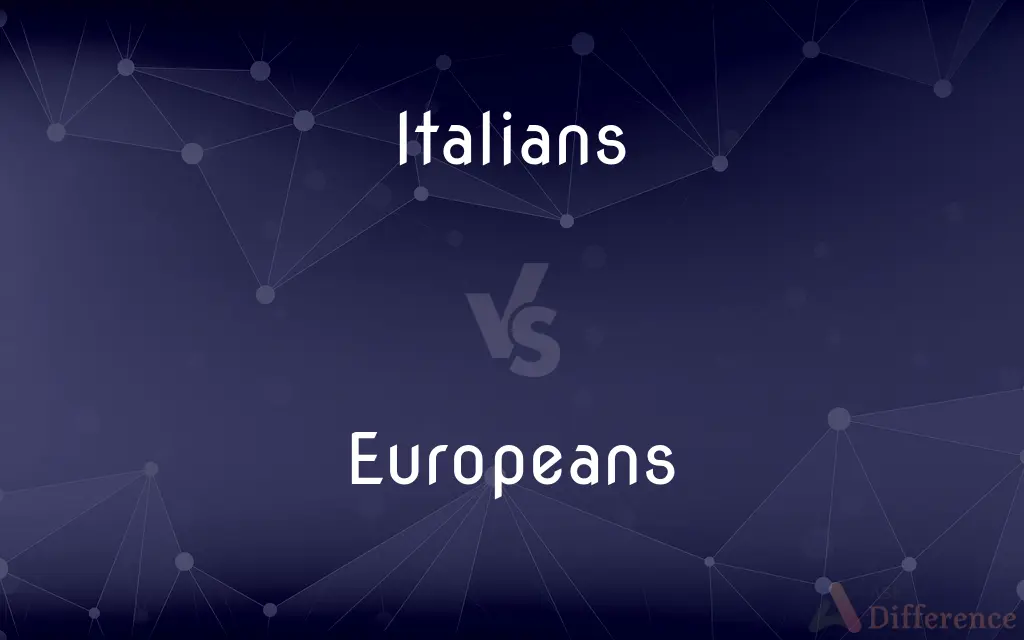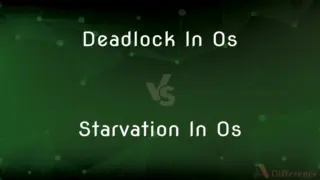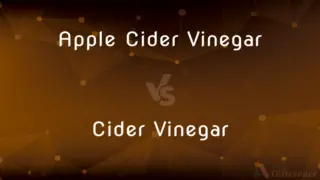Italians vs. Europeans — What's the Difference?
Edited by Tayyaba Rehman — By Fiza Rafique — Published on December 8, 2023
Italians are the citizens or natives of Italy, while Europeans are people from any of the countries within the continent of Europe.

Difference Between Italians and Europeans
Table of Contents
ADVERTISEMENT
Key Differences
Italians are individuals who originate from or hold citizenship in Italy, a country in Southern Europe. They are recognized for their distinct culture, language, and history. Europeans, on the other hand, encompass a broader group that includes people from any of the approximately 50 countries in Europe.
While Italians are known for their contributions to art, cuisine, and music, Europeans represent a diverse tapestry of cultures, languages, and traditions from various European nations. This diversity includes not just Italians but also Germans, French, Spaniards, and many others.
Italians speak Italian, a Romance language, and are predominantly associated with Italy's cultural and historical heritage. Europeans, however, speak various languages, including English, German, French, and many others, reflecting the linguistic diversity of the European continent.
Italy's geographical location in the Mediterranean significantly influences Italian culture and lifestyle, which is characterized by a love for food, family, and the arts. In contrast, Europeans experience a variety of geographical influences, from the northern chill of Scandinavia to the eastern traditions of the Balkans.
In summary, Italians form a specific, identifiable group within the larger, more diverse category of Europeans. While Italians contribute to the richness of European diversity, Europeans as a whole represent a wide array of nationalities, cultures, and perspectives.
ADVERTISEMENT
Comparison Chart
Nationality
From Italy
From any European country
Language
Primarily Italian
Various languages, including Italian
Cultural Identity
Italian culture, art, cuisine
Diverse cultures from all of Europe
Geographic Origin
Southern Europe
Entire European continent
Citizenship
Italian citizenship
Citizenship of any European country
Compare with Definitions
Italians
Natives of Italy.
The Italians are known for their rich culinary heritage.
Europeans
Residents of European continent.
Europeans experience varied climates and geographies.
Italians
Speakers of Italian language.
Italians converse fluently in Italian.
Europeans
Speakers of European languages.
Europeans speak a multitude of languages.
Italians
Participants in Italian culture.
Italians celebrate traditional festivals.
Europeans
Inhabitants of Europe.
Europeans enjoy a diverse cultural landscape.
Italians
Residents of Italy.
Many Italians live in picturesque Tuscan villages.
Europeans
Citizens of European countries.
Europeans often travel freely within the EU.
Italians
Italian citizens.
Italians voted in the national election.
Europeans
Participants in European culture.
Europeans share a rich historical heritage.
Italians
Of or relating to Italy or its people, language, or culture.
Europeans
A native or inhabitant of Europe.
Italians
A native or inhabitant of Italy.
Europeans
A person of European descent.
Italians
A person of Italian ancestry.
Europeans
Of or relating to Europe or its peoples, languages, or cultures.
Italians
The Romance language of the Italians and an official language of Switzerland.
Common Curiosities
Can Italians be considered Europeans?
Yes, Italians are Europeans as Italy is part of Europe.
Are Italians only from Italy?
Primarily, yes, though people of Italian descent may live elsewhere.
What languages do Europeans speak?
Europeans speak various languages, depending on their country of origin.
Who are Europeans?
Europeans are people from any of the countries within Europe.
Do Italians have a distinct identity within Europe?
Yes, Italians have a distinct cultural and national identity.
What language do Italians speak?
Italians primarily speak Italian.
Who are Italians?
Italians are people from Italy or those holding Italian citizenship.
Is Italian culture different from other European cultures?
Yes, Italian culture has unique aspects, although it shares some similarities with other European cultures.
Is Italian cuisine popular among other Europeans?
Yes, Italian cuisine is widely popular and appreciated in Europe.
Do Italians and other Europeans share any common values?
Yes, there are shared values like democracy, human rights, and cultural appreciation.
Do all Europeans share the same traditions?
No, European traditions vary widely across different countries.
Do Italians need visas to travel to other European countries?
Italians usually don't need visas to travel to other EU countries.
Are there cultural exchanges between Italians and other Europeans?
Yes, there are frequent cultural exchanges and interactions.
Can a person be European but not Italian?
Yes, if they are from a European country other than Italy.
How diverse is the European population?
The European population is highly diverse in terms of culture, language, and ethnicity.
Share Your Discovery

Previous Comparison
Deadlock In Os vs. Starvation In Os
Next Comparison
Apple Cider Vinegar vs. Cider VinegarAuthor Spotlight
Written by
Fiza RafiqueFiza Rafique is a skilled content writer at AskDifference.com, where she meticulously refines and enhances written pieces. Drawing from her vast editorial expertise, Fiza ensures clarity, accuracy, and precision in every article. Passionate about language, she continually seeks to elevate the quality of content for readers worldwide.
Edited by
Tayyaba RehmanTayyaba Rehman is a distinguished writer, currently serving as a primary contributor to askdifference.com. As a researcher in semantics and etymology, Tayyaba's passion for the complexity of languages and their distinctions has found a perfect home on the platform. Tayyaba delves into the intricacies of language, distinguishing between commonly confused words and phrases, thereby providing clarity for readers worldwide.














































